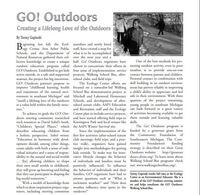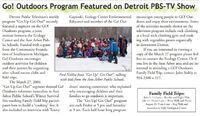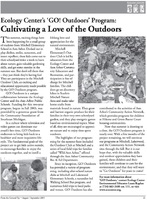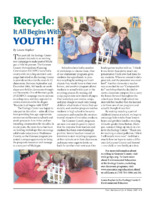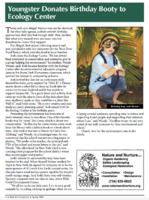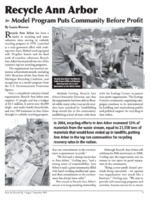Go! Outdoors and In-School Education
Go! Outdoors Campaign
The Ecology Center and its members emphasize the importance of environmental education and advocacy for young people in the community. Through initiatives that impact them and expanding educational opportunities, the next generation can further the fight for the environment and community. In 2003, Ann Arbor schools including the public school system and the University of Michigan created environmental education opportunities, had buildings reach LEED certification, a third-party certification program for buildings that are aimed at water savings, energy efficiency, CO2 emissions reduction, and improved environmental quality, and created new bus systems. The Ecology Center furthered these initiatives by creating an outdoor education program partnered with the Ann Arbor public school district and the Department of Natural Resources, called GO! Outdoors, an outdoor education program that included expanding children’s knowledge of environmental processes and encouraging them to stay active.
The initial funding for this project came from the Community Foundation of Southeast Michigan and had four areas of focus: service projects, the Walking School Bus, field trips, and after school clubs. The goal of this program was to create a lifelong love of nature and to educate children on important environmental topics.
One of the first initiatives of the program was the “Walking School Bus” at Mitchell Elementary which would involve two adults walking a circular route around the neighborhood picking up kids and walking to school, when weather permitted. At the same elementary school, the Ecology Center used this grant money to sponsor an outdoor club that gave students the opportunity to learn about nature around them and to gain gardening skills, all while keeping up exercise during the summer months. Led by Ecology Center educators, children had the opportunity to go on hikes around nature areas in Ann Arbor and to make take-home crafts from items they found. They also grew and harvested produce, while playing games that taught them about environmental systems.
“It is our hope that, with the valuable skills and outdoor appreciation they have gained, these children and their families will continue to care for the environment, and that they will want to “Go Outdoors” for years to come.”
The campaign was initially expanded to Lakewood and community action sites, however, these programs ended after the fall due to a lack of grant funding. Although the Go! Outdoors campaign ultimately ended in 2005, the Ecology Center continued to create in and out of school education programs for children.
In-School Education
In 2007, the Ecology Center helped the Genesee County Metropolitan Planning Committee, which relied on recycling services from The Ecology Center, launch a recycling outreach program for K-12 classrooms. The Ecology Center held 100 educational workshops to provide age-appropriate environmental lessons between September and December 2006. These workshops included age-appropriate activities to teach children about recycling processes, what products can be recycled, and the environmental benefits of recycling through games, stories, and songs.
As the decade wound down, The Ecology Center continued to expand environmental youth initiatives throughout 2009. With their school program “Project Recycle!”, they were able to teach children from the area how to reduce landfill waste through inventive games, including one where as detectives they were instructed to find clues to follow the path that trash makes on its way to the landfill. Project Recycle helped teach children what items could be included in recycling and identified curbside guidelines for their neighborhood pickup. Recycle Ann Arbor and The City of Ann Arbor both sponsored this program, which also helped schools in the area receive the distinction as a Michigan Green School. In that same year, 9 year old Josh Weiner, who had been involved in programs with The Ecology Center through his elementary school, gave the money he received from his birthday as a donation to The Ecology Center to help with their future work. Something about how this exemplifies the impact the EC made on students.
Other Education Initatives
In 1999, the Ecology Center built the Environmental House as a demonstration home to show how to construct and live in a home made from sustainable and energy efficient products. The Environmental House has been a driving force in the community to create a coalition of local builders, architects, and professionals dedicated to sustainable building practices, this coalition was called the Washtenaw Green Building Coalition. In 2005, the Environmental House started to offer home energy ratings, which were led by LEED-certified and HERS-qualified architects, both certified positions that assess a building's energy efficiency and environmental impact.
This program educated homeowners about how to create energy-efficient homes, associated costs, and how green homes can allow homeowners to refinance their homes or make improvements. These educational programs are vital to creating and sustaining more green communities, as well as giving people information to which they might not otherwise be exposed.
The Ecology Center did not only work with schools in the community to expand recycling programs and education. They also launched Energy Works. This program was created after the Ecology Center and Recycle Ann Arbor received a grant from the Michigan Public Service Commision. After receiving this grant, the Energy Works project created the Michigan Renewable Schools Program. This program would have four different initiatives that together would reach 80 schools throughout Michigan through their work. The Michigan Renewable Schools Program was a 2-year program dedicated to educating future generations throughout Michigan on the importance of renewable energy and energy efficiency. These four programs included specializations in public outreach, education of teachers and students throughout Michigan, and new energy technologies. One program was the Energy Efficiency program, which created energy audits for schools systems and provided recommendations for improvements. They would help schools develop a “strategic Energy Action Plan” to save money through energy efficiency and reduce CO2 emissions. The next program was The Renewable Energy Program, which installed small-scale PV systems and wind turbines, as well as produced data on temperature, insulation, and wind direction and speed. This data was for use by teachers as well as accessible to the general public. The third initiative was The Post-Secondary Program, which invited community and junior colleges to apply for grants to continue outreach activities, such as speaking to younger students about opportunities within the environmental field for school and future career paths. The final program within The Michigan Renewable Schools Program was The Curriculum Development Program, that educated teachers on solar and wind equipment and the importance of energy efficiency. It also allowed participating instructors to use solar and wind monitoring equipment. For teachers to participate their school needed to demonstrate commitment to sustainable energy efforts.

